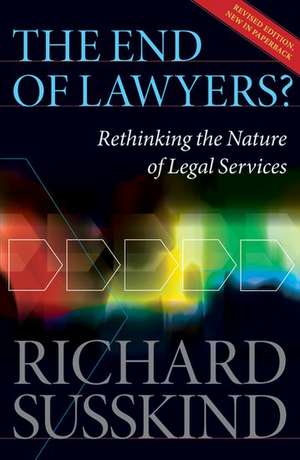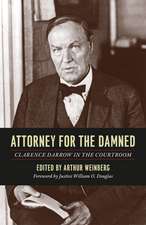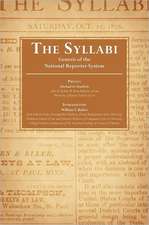The End of Lawyers?: Rethinking the nature of legal services
Richard Susskind OBEen Limba Engleză Paperback – 16 sep 2010
Preț: 218.61 lei
Preț vechi: 235.50 lei
-7% Nou
Puncte Express: 328
Preț estimativ în valută:
41.83€ • 44.73$ • 34.88£
41.83€ • 44.73$ • 34.88£
Carte tipărită la comandă
Livrare economică 07-14 aprilie
Livrare express 13-19 martie pentru 47.80 lei
Preluare comenzi: 021 569.72.76
Specificații
ISBN-13: 9780199593613
ISBN-10: 0199593612
Pagini: 358
Ilustrații: Illustrations
Dimensiuni: 152 x 232 x 21 mm
Greutate: 0.54 kg
Ediția:Revizuită
Editura: Oxford University Press
Colecția OUP Oxford
Locul publicării:Oxford, United Kingdom
ISBN-10: 0199593612
Pagini: 358
Ilustrații: Illustrations
Dimensiuni: 152 x 232 x 21 mm
Greutate: 0.54 kg
Ediția:Revizuită
Editura: Oxford University Press
Colecția OUP Oxford
Locul publicării:Oxford, United Kingdom
Recenzii
Anyone who wishes to understand where the profession has been and where it is going shoudl read the book
Review from hardback edition His advice cannot be ignored by those lawyers who want to survive the economic turmoil
I feel Susskind has made an excellent start by opening up the debate'
The End of Lawyers is a fascinating and timely book
This book is addictive! Susskind has done it again with an extremely engaging blend of advice.
I believe anyone working in a professional service form could find useful examples of what can be accomplished in their own profession, throughout this book
Richard Susskind's predictions of 1996, in The Future of Law, can now be seen to be coming to pass. I am confident that those in this new work, where he looks even further into the future, will likewise come to pass, given the extraordinary depth of knowledge, analysis and reasoning he has brought to bear and which this book demonstrates on every page
Richard Susskind speaks to the issues facing law firms big and small, in-house legal teams, legal publishers, training establishments and individual lawyers. He has a lucid style informed by personal experience and observation and deep connections within the legal profession. This book should be compulsory reading for all who care about the future of the law.
If you don't quickly absorb what Susskind has to say, you'll already be behind in adapting to the modern legal profession, in-house as well as private practice. You can't and won't agree with everything here, but you must read it all and think about it all. It would be irresponsible (and self-destructive) to avoid reflecting on the voluminous arguments and examples presented here.
Susskind remains the only the writer today who can put the future of lawyers and the legal professions on the agenda at the highest levels of government, the judiciary, the legal institutions, major corporations - and law firms
In The End of Lawyers?, Richard Susskind brilliantly and passionately shows us how to think about practising law in the 21st century. The book's inspirational outlook and yet practical approach make it a must-read for any lawyer aspiring to achieve professional success and make a difference for his or her clients.
Richard Susskind's new book tells us that we should, contrary to the profession's engrained conservatism, turn our mind to the future to better understand the profession and the law. It is thought-provoking and entertaining at the same time. I strongly encourage law firms and in-house lawyers to read this book and to embrace the new methods and technologies that Richard Susskind is recommending
This is a fascinating book. It raises serious questions not only about the future of legal practice, but about how legal services are structured and delivered now. As is to be expected from Susskind, the arguments are pacey and challenging. The conclusions and predictions are likely to provoke strong reactions, but the book will not fail to engage.
A wide-ranging book that is of value not only to lawyers contemplating their future, but to anyone whose work touches upon the law. Blending the futures of law and technology, Susskind's vision is far-reaching and tightly-argued, showing the displacement that lies ahead -- and the ways in which society can gain from it
This book paints a scary future. But as a call to arms, to embrace the future, it lays down a challenge for lawyers everywhere for we have no birthright, no power to avoid development, to 'freeze the frame'. Susskind makes a most persuasive case that the 'incremental revolution' has already arrived; so join it or be left on the wrong side of the barricades.
Susskind's engaging book urges a drastic reassesment of the legal profession and suggests a series of reforms for law firms of the future
In light of the current economic climate, Susskind may find that his predictions come true sooner than even he thinks
This is an enormously important book, and if you have any interest in how the legal marketplace will operate in future, you have to read it
We talk a lot about "visionaries" these days, but in the legal profession, nobody seriously competes with Richard Susskind for this title, and this book shows why
The End of Lawyers is a must read for every managing partner in the country
This is a strikingly thought-provoking book and a must-read for all law firms
This book makes some clear predictions about what lawyers will do and not do in the future, but is most valuable for raising the issues in the first place. It is a proactive peek into the possible future of legal work and the lawyers who perform it
The End of Lawyers? is a road map to the archipelago of legal innovation already emerging all around us. Ignore it at your peril
If you are ready to look into Susskind's question, this book makes a fascinating reading. And if you are serious about embracing the changing environment, it is a primer for new ideas in bold action
If you are a lawyer and haven't read Richard's book, you should. And no, reading the reviews and the articles about the book won't suffice. Buy the book, sit in a quiet room and read deeply about his predictions of the future of the practice of law
This should be essential reading for anyone who does not believe that legal education at degree and postgraduate level will not be transformed by technology
If you have not read the book then I commend it to you
This is an outstanding publication. Buy it. Read it. Think about it.
Susskind's book will deservedly be the starting point for an understanding of the potentials and the failings of technology and legal services. It is a book stocked with ideas and examples in which I would defy any open-minded reader not to see the potential for significant change in the legal world
The End of Lawyers is a fascinating and challenging book. Susskind gently and persuasively chips away at the assumptions and preferences that we carry with us about what law is and how it is provided. His book is essential reading not just for law students and their methodology professors but for acadmics and practitioners more generally
Review from hardback edition His advice cannot be ignored by those lawyers who want to survive the economic turmoil
I feel Susskind has made an excellent start by opening up the debate'
The End of Lawyers is a fascinating and timely book
This book is addictive! Susskind has done it again with an extremely engaging blend of advice.
I believe anyone working in a professional service form could find useful examples of what can be accomplished in their own profession, throughout this book
Richard Susskind's predictions of 1996, in The Future of Law, can now be seen to be coming to pass. I am confident that those in this new work, where he looks even further into the future, will likewise come to pass, given the extraordinary depth of knowledge, analysis and reasoning he has brought to bear and which this book demonstrates on every page
Richard Susskind speaks to the issues facing law firms big and small, in-house legal teams, legal publishers, training establishments and individual lawyers. He has a lucid style informed by personal experience and observation and deep connections within the legal profession. This book should be compulsory reading for all who care about the future of the law.
If you don't quickly absorb what Susskind has to say, you'll already be behind in adapting to the modern legal profession, in-house as well as private practice. You can't and won't agree with everything here, but you must read it all and think about it all. It would be irresponsible (and self-destructive) to avoid reflecting on the voluminous arguments and examples presented here.
Susskind remains the only the writer today who can put the future of lawyers and the legal professions on the agenda at the highest levels of government, the judiciary, the legal institutions, major corporations - and law firms
In The End of Lawyers?, Richard Susskind brilliantly and passionately shows us how to think about practising law in the 21st century. The book's inspirational outlook and yet practical approach make it a must-read for any lawyer aspiring to achieve professional success and make a difference for his or her clients.
Richard Susskind's new book tells us that we should, contrary to the profession's engrained conservatism, turn our mind to the future to better understand the profession and the law. It is thought-provoking and entertaining at the same time. I strongly encourage law firms and in-house lawyers to read this book and to embrace the new methods and technologies that Richard Susskind is recommending
This is a fascinating book. It raises serious questions not only about the future of legal practice, but about how legal services are structured and delivered now. As is to be expected from Susskind, the arguments are pacey and challenging. The conclusions and predictions are likely to provoke strong reactions, but the book will not fail to engage.
A wide-ranging book that is of value not only to lawyers contemplating their future, but to anyone whose work touches upon the law. Blending the futures of law and technology, Susskind's vision is far-reaching and tightly-argued, showing the displacement that lies ahead -- and the ways in which society can gain from it
This book paints a scary future. But as a call to arms, to embrace the future, it lays down a challenge for lawyers everywhere for we have no birthright, no power to avoid development, to 'freeze the frame'. Susskind makes a most persuasive case that the 'incremental revolution' has already arrived; so join it or be left on the wrong side of the barricades.
Susskind's engaging book urges a drastic reassesment of the legal profession and suggests a series of reforms for law firms of the future
In light of the current economic climate, Susskind may find that his predictions come true sooner than even he thinks
This is an enormously important book, and if you have any interest in how the legal marketplace will operate in future, you have to read it
We talk a lot about "visionaries" these days, but in the legal profession, nobody seriously competes with Richard Susskind for this title, and this book shows why
The End of Lawyers is a must read for every managing partner in the country
This is a strikingly thought-provoking book and a must-read for all law firms
This book makes some clear predictions about what lawyers will do and not do in the future, but is most valuable for raising the issues in the first place. It is a proactive peek into the possible future of legal work and the lawyers who perform it
The End of Lawyers? is a road map to the archipelago of legal innovation already emerging all around us. Ignore it at your peril
If you are ready to look into Susskind's question, this book makes a fascinating reading. And if you are serious about embracing the changing environment, it is a primer for new ideas in bold action
If you are a lawyer and haven't read Richard's book, you should. And no, reading the reviews and the articles about the book won't suffice. Buy the book, sit in a quiet room and read deeply about his predictions of the future of the practice of law
This should be essential reading for anyone who does not believe that legal education at degree and postgraduate level will not be transformed by technology
If you have not read the book then I commend it to you
This is an outstanding publication. Buy it. Read it. Think about it.
Susskind's book will deservedly be the starting point for an understanding of the potentials and the failings of technology and legal services. It is a book stocked with ideas and examples in which I would defy any open-minded reader not to see the potential for significant change in the legal world
The End of Lawyers is a fascinating and challenging book. Susskind gently and persuasively chips away at the assumptions and preferences that we carry with us about what law is and how it is provided. His book is essential reading not just for law students and their methodology professors but for acadmics and practitioners more generally
Notă biografică
Richard Susskind is Honorary Professor of Law at Gresham College, London, IT adviser to the Lord Chief Justice, and an independent consultant to professional firms and national governments. He is Chair of the Advisory Panel on Public Sector Information, and a Fellow of the Royal Society of Edinburgh and of the British Computer Society. He studied law at Glasgow University and has a doctorate in law and computers from Balliol College, Oxford.His views on the future of the legal profession have influenced a generation of lawyers around the world. He has written several books, including Expert Systems in Law (OUP, 1987), The Future of Law (OUP, 1996), and Transforming the Law (OUP, 2000), and has been invited to speak in over 40 countries. He was awarded an OBE in the Millennium New Year's Honours List for services to IT in the Law and to the Administration of Justice.








